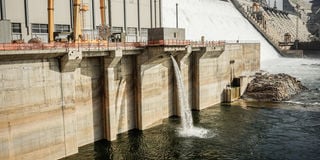Prime
Ethiopia completes 90% of controversial Nile dam construction

The Grand Ethiopian Renaissance Dam (GERD) in Guba, Ethiopia, on February 19, 2022. PHOTO/ AFP
What you need to know:
- Ethiopia, Sudan and Egypt have been locked in talks for about a decade over the dam, after Addis Ababa broke ground on the project in 2011.
Ethiopia has said the overall construction of its controversial mega-dam project, Grand Ethiopian Renaissance Dam (GERD) has reached the 90 per cent mark.
This was announced by the Office of National Coordination for the Construction of the Dam at an occasion held in connection with the 12th anniversary of the laying of the foundation stone of GERD.
Addis Ababa's announcement comes only few days after Egypt issued a fresh warning against Ethiopia over the latter's multi-billion-dollar dam project which would be Africa's largest upon completion.
On March 15, Cairo issued a fresh warning saying that 'all options are on the table' to deal with any threats to its water supply posed by the Ethiopian mega-dam.
"We just declare all options open without defining specific procedures, and this serves the Egyptian interest in retaining all available alternatives.” Egyptian Foreign Minister Sameh Shoukry warned adding that “Egypt takes disciplined stances towards Ethiopian intransigence."
A day later, Addis Ababa angrily responded dismissing the remarks of the Egyptian Foreign Minister as "irresponsible."
Meanwhile, Sudanese Finance Minister Gibril Ibrahim on Thursday said the power to be generated from GERD will not only be enough for the neighboring countries but also contribute to the development of the entire region.
In an exclusive interview with the state-run Ethiopian News Agency (ENA), the minister noted that one cannot have economic development without power.
"We think the new dam is going to help us [Sudan] have enough and cheap energy from Ethiopia," he said.
On the other hand, the food production from Sudan's vast arable land can help Ethiopia's needs, he said, and emphasized that the countries "need to work together on agriculture to make sure that all of our people are getting enough food."
Resolving Differences
Ethiopia, Sudan and Egypt have been locked in talks for about a decade over the dam, after Addis Ababa broke ground on the project in 2011.
The minister stressed that Ethiopia, Sudan and Egypt need to think positively and understand each other in a bid to find lasting solutions.
“Sudan has a more than 750 kilometers coast on the Red Sea and we do think Ethiopia can make use of the Red Sea and have a free zone at our ports. That will help Ethiopia and Sudan to develop,” the minister explained.
Ibrahim elaborated that the two countries "need to cooperate and build the needed infrastructures that connect our people. Roads, railways, and of course, airlines are working well but we do think we need railways and roads to make sure that our people are connected"
Downstream concerns
Cairo and Khartoum fear that the huge dam being constructed near the Sudanese border would eventually diminish their historic water shares from the Nile River hence consider the Ethiopian dam as a threat to their water security.
They insist that Ethiopia halts water filling operations until the parties reach a legally binding agreement with Ethiopia on the overall operation of the dam.
Addis Ababa, however, argues that the dam will not have a significant impact on the natural water flow into the downstream countries.




